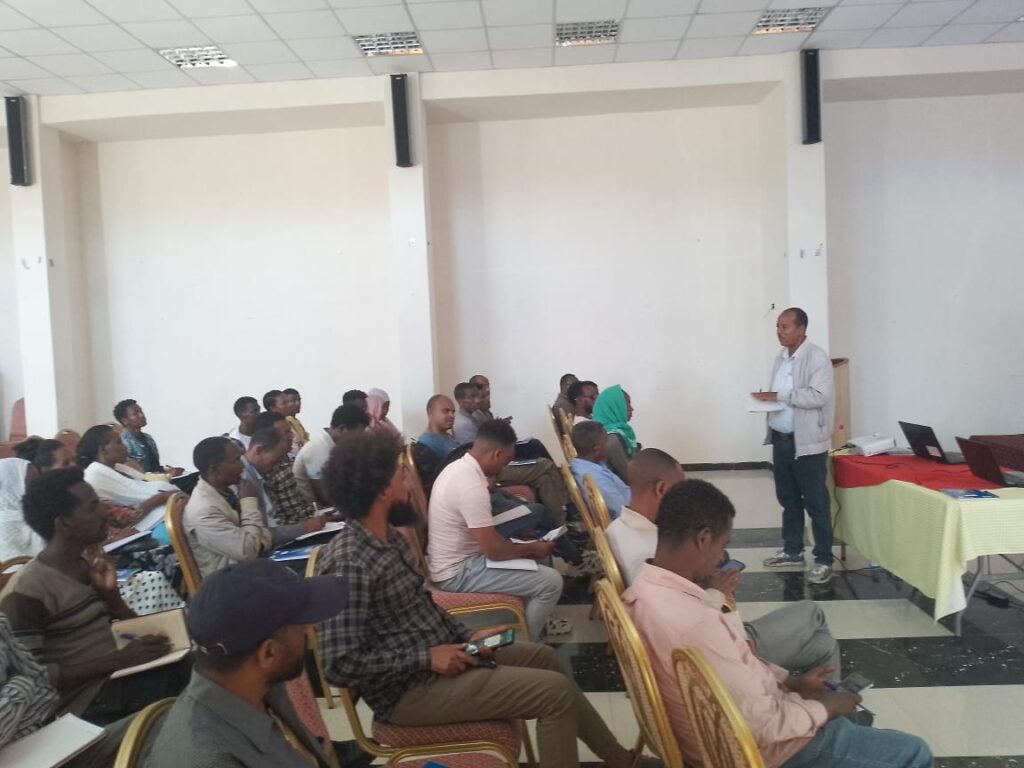The Wurich Water Point
Improving Public Health Outcomes: The Wurich Water Point “Water-borne diseases may affect us if we cannot promptly maintain and manage our water points. We are currently in danger, especially with…
In a commendable effort to bolster food security and environmental sustainability in the face of ongoing challenges, the Relief Society of Tigray (REST) embarked on a comprehensive training initiative focused on “Agrobiodiversity and Genetic Preservation.” This meticulously designed program targeted a diverse range of stakeholders, creating a collaborative platform for knowledge exchange and capacity building.
The training sessions, meticulously planned and executed by REST, specifically catered to:
Government Experts: These key decision-makers were equipped with in-depth knowledge on the latest advancements in agrobiodiversity and genetic preservation practices. This enhanced understanding empowered them to formulate effective policies and regulations that safeguard the region’s precious agricultural heritage.
Development Agents: As the vital link between REST and local communities, development agents were provided with practical tools and strategies to effectively disseminate the acquired knowledge amongst farmers. Their enhanced skillset would ensure the program’s successful implementation at the grassroots level.
Regional Specialists from Adwa and Zana Districts: Recognizing the unique agricultural ecosystems within these districts, REST strategically included regional specialists. By equipping them with targeted knowledge specific to their local contexts, REST ensured the program’s adaptability and effectiveness across diverse agro-ecological zones.
The training sessions transcended mere theoretical discussions. REST, understanding the importance of experiential learning, incorporated interactive modules and practical demonstrations. This ensured participants grasped not only the theoretical underpinnings of agrobiodiversity and genetic preservation but also the practical application of these principles in real-world agricultural settings.
Furthermore, the sessions served as a platform for delivering updates on prior training initiatives undertaken by REST. This continuous knowledge exchange fostered a sense of community and collective progress amongst the participants. It allowed them to build upon existing knowledge, identify areas for improvement, and refine their approaches based on shared experiences.
The Relief Society of Tigray’s commitment to agrobiodiversity and genetic preservation extends beyond these training sessions. By empowering a diverse range of stakeholders with the necessary knowledge and skills, REST is laying the foundation for a more resilient agricultural sector in Tigray.


This initiative has the potential to:
Enhance food security: By promoting the cultivation of a wider variety of crops, the program aims to reduce dependence on a limited number of staple crops, thereby mitigating the risk of food shortages in the face of environmental or economic disruptions.
Promote environmental sustainability: The preservation of indigenous crop varieties fosters a more balanced and ecologically sound agricultural system. This not only protects biodiversity but also contributes to soil health and overall ecosystem resilience.
Empower local communities: By equipping farmers with the knowledge and skills to cultivate diverse and resilient crops, REST is empowering them to take charge of their own food security and build a more sustainable future for themselves and their families.
The Relief Society of Tigray’s investment in agrobiodiversity and genetic preservation serves as a beacon of hope in a region grappling with various challenges. Through this strategic initiative, REST is not only promoting sustainable agricultural practices but also fostering a sense of community and collective action, paving the way for a more secure and prosperous future for Tigray.
Improving Public Health Outcomes: The Wurich Water Point “Water-borne diseases may affect us if we cannot promptly maintain and manage our water points. We are currently in danger, especially with…
Transforming Communities: The Story of Daba Gray Water Point Situated in Debre Genet Tabia’s Woreda Kola Tembien, the Daba Gray Water Point once provided a vital source of clean water…
Empowering Rural Women: Alem Teka’s Story Alem Teka, a forty-year-old woman from Embasineyti Woreda, faced immense challenges accessing clean water for her family. Without formal education, she trekked long distances…
Thirst Under the Tigray Sun: A Story of Resilience and Relief Imagine this: a relentless sun beating down on parched earth. Thirteen-year-old Hertig Birhane, a cowboy at heart, grazes his…
Vermicomposting in Laelay Legomti Tesfamariam Welu, a pillar of his six-person household in Laelay Legomti village, exemplifies the transformative power of vermicomposting (worm composting) in enriching lives and cultivating a…
Building Resilience Through Knowledge In a commendable effort to bolster food security and environmental sustainability in the face of ongoing challenges, the Relief Society of Tigray (REST) embarked on a…
Successfully Completes Spate Irrigation Project The Relief Society of Tigray (REST) is proud to announce the successful completion and handover of a new spate irrigation project in Enderta wereda, Metkel,…
Partnership with the Tigray Biotechnology Center (TBC)! Exciting News from REST Tigray! We are thrilled to share some heartening updates from us in partnership with the Tigray Biotechnology Center (TBC)!…
Mehira’s Story: Life without Access to Clean Water Mehira Gebru, 28 years old, shares her story: “I’m displaced from Afar, Awash Sebat village. The place where I used to…
Empowering Dreams: Providing Access to Clean Water Birhan’s Testimonial “After 5 months of failure, I am overjoyed that the water point is functional again. I want to become a teacher…
Restoring Clean Water Access in Tigray: A Story of Resilience WASH Emergency – Scheme Maintenance Kiros Girmay, a mother of seven from Tigray, relied on a well for clean water…